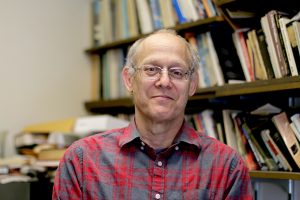Alan Shapiro, a poet and professor emeritus in the department of English and comparative literature, reflects on his experience in the Institute for the Arts and Humanities’ Faculty Fellowship Program and his poem about scholarly work, “The Conversation.”
Editor’s  Note: Enjoy an excerpt from Shapiro’s poem “The Conversation” at the end of this feature.
Note: Enjoy an excerpt from Shapiro’s poem “The Conversation” at the end of this feature.
To writer Alan Shapiro, the Faculty Fellowship experience is an opportunity that brings people together from different disciplines, perspectives and viewpoints. Shapiro, who participated in the Faculty Fellowship Program in 1999 and 2009, said the chance to generate intellectual exchange is a theme that the Institute for the Arts and Humanities (IAH) and his poem, “The Conversation,” share.
Shapiro’s poem, “The Conversation,” meditates on the open-endedness of scholarly work, which never reaches a final answer, and how conversation plays a vital role in intellectual exchange.
The poem’s themes were assigned by Institute Founding Director Ruel Tyson, who commissioned Shapiro to write the poem for the 2002 opening of the IAH’s new building, Hyde Hall. Tyson asked for a poem that explores the private space of the study and the public space of intellectual exchange. In the poem, Shapiro hoped readers would grasp that there is always something more to be learned from another perspective, and that there is never any absolute certainty when it comes to academic work and collaboration.
“One of the things that I really loved about UNC was the commitment to interdisciplinary conversation,” Shapiro said.
One member of his 1999 cohort was legendary basketball coach Dean Smith, who was writing his autobiography during the fellowship and later bought several copies of Shapiro’s book for his staff.
As he reflected on his Faculty Fellowship Program experiences, Shapiro said, “I think it’s the great purpose of the Institute: bringing people together from different disciplines, perspectives, viewpoints, and just generating intellectual exchange.”
In feeling welcomed in such a community, he felt part of a larger conversation – something he worked to capture in the poem.
Shapiro said he thinks his poem ties into the greater field of the arts and humanities as well. The poem has connections to Homer and Greek myths – one verse alludes to the story of Philomela in Ovid’s Metamorphosis – but it also speaks to how literature helps people cope with life and its struggles, particularly those very violent but very human struggles.
“That is, violence gets transmuted into conversations about violence, which then, we hope, helps us understand it, control it better or become, at least, a little less enthralled to it,” Shapiro said.
He also feels that there is always something more to be learned in his own personal career, and he says it’s why he loves being a teacher. He has taught for about 45 years, spending 25 of those years at UNC-Chapel Hill; he retired in 2021. Shapiro said the students reminded him of where he needed to be in his career, which was always embarking on something new, always with everything to learn.
“I aspired to be a student my whole life, and that’s sort of why I love teaching and why teaching in some way was the perfect accompaniment to the life of a writer,” Shapiro said.
By Laney Crawley ’26, Institute for the Arts and Humanities
***
The Conversation
All morning as we talk inside the room
around the table, our bodies are aswarm
with light and shade, our voices like a web
hung in the air between us, stitching
and unstitching in the telling and the hearing,
the taking issue with, concord and discord,
every one of us around the table
